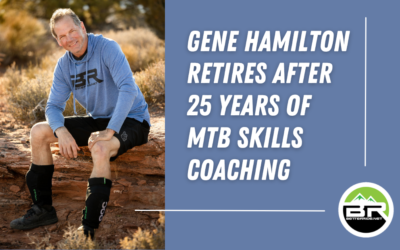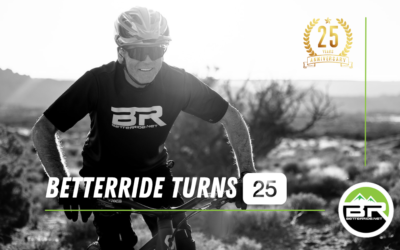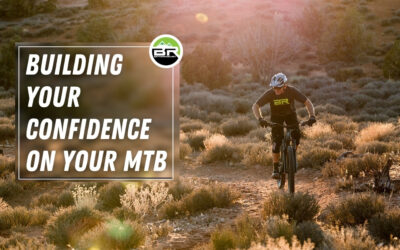Ned Overend’s Secret to Riding Strong in Your 40’s, 50’s and Beyond
One of my mountain biking heroes is Ned Overend. If you don’t know the name, Ned was a six-time US National cross country Champion and he won the first MTB World Championships. Then, in ‘98 and ‘99 (when he was 42&43) he won consecutive Xterra World Championships. At 50 he was 9th fastest on the bike leg and finished 21st at the Xterra World Championships.
What Ned DOESN’T do is long, low-medium intensity rides. He prefers hard rides of less than two hours and only rides three days a week.
There lies his secret: INTENSITY, and RECOVERY. As we age we simply need more recovery to perform well.
High-intensity training slows the rate of decline in our VO2max (the maximum rate of oxygen consumption measured during incremental exercise), and as we age we need more recovery from that.
I started on a similar program to Ned’s program about 10 years ago. I read an article online where he mentioned he only rode three days a week and rode as hard as he could for 1.5-2 hours most of the time.
I was struggling to ride two or three days in a row and found I wasn’t enjoying my riding quite as much as I used to. So I took Ned’s advice and started riding harder for less time and focusing on recovery.
I decided to focus on high-quality rides, rest, and keeping my body strong by doing Foundation Training two to three days a week and riding three days a week. I stretch, foam roll, and do a little yoga six to seven days a week to keep my body moving with ease.
Now, I modified my program to do two to four-hour rides. I climb at moderate intensity and descent at high intensity. This way I get my high intensity in but get to ride a little longer than Ned – probably the same distance as Ned, just faster on the descents and slower on the climbs. Actually, way slower on the climbs 😊 Here is a Strava screenshot of Ned at 62 vs me at 55.
This program not only works, but only riding three days a week really keeps me excited about riding. I used to take six weeks a year off my bike to avoid burnout, but when I only get to ride three days a week I’m always excited to ride!
I have also really focused on my nutrition and sleep. I have cut way back on my carbohydrate intake (went full Keto for two years, now just try not to eat too many carbs except when riding) and have created an end-of-the-day routine to ease my anxiety and prepare for a good night’s sleep.

My routine starts an hour before I want to fall asleep. I turn off all of my wired devices and start slowing down. I dim the lights, spend 20-60 minutes stretching, meditating, and doing breathing exercises. This calms my brain and body down helps me fall asleep quicker and get better quality sleep.
If you are starting to feel worn out, burnt out, or simply old, cut back on the amount of riding you do and focus on quality, intense rides, and getting good recovery. It seems to work for me and apparently works quite well for Deadly Nedly!
Please share this article with anyone you think may benefit and feel free to call or e-mail with any questions.
Cheers
Gene





Great article! While I agree that sometimes less is more one thing to factor in with both you and Deadly Nedly is that you were both ex-Pro’s with past mileage, hours and general training beyond what is mortals have experienced. As MTB nats is going on and with most of the other disciplines (road, Cx etc) you can see that the top 5-10 results in masters cars at riddled with ex-Pro’s names in the masters cats. Cat1/2 mtb xco ‘21 silver for podium went to Travis brown (ex trek WC pro). Because of your strong base of fitness and skill a tune up is sufficient where us (or at least me) amateur-hour desk jockeys have to work on it a bit more with more hours and skill tuneups (as betterride provides!). Just saying talent and past mileage goes a long way.
Hi Mark,
Thanks for putting me in the same category as Ned but I was never able to do the long rides, I’ve only done two rides over 50 miles in my life and both included a lot of road. From what Chris Carmichael says in his book “The Time-crunch Cyclist” he believes base miles are a waste if you have less than 15-20 hours a week to train (I read the book years ago so the exact amount of hours escapes me).
great article
Thanks, David!
When Ned turned 50, he was the overall winner of the Mount Washington Uphill Bike Race.
https://joefrielsblog.com/what-it-takes-to-be-fast-after-50/ Covers it all and backs it up with footnoted sources. This applies to everybody of all ages. Recovery is key. Good take, Zone 2 rides are still good. People go too hard. 80% zone 2 and the other 20% wide open like NED. Wonder what he doest in between off the bike? Get this book. https://joefrielsblog.com/what-it-takes-to-be-fast-after-50/
Thanks, Glenn. Always like to read what Joe Friel has to say! Carmicheal in his “Time-Crunched Cyclist” book talks a lot about the importance of intensity if you have less than 20 hours a week to train (which I assume is most of us!).
Gene, great post as usual. I was not familiar with Ned Overend, but this man is clearly a beast. Being two months shy of age 63 I can relate to this; more rest is certainly needed, and I still have a very high capacity for high intensity work on my mountain bike, on a stationary bike, elliptical machine, weights, whatever. My bike rides are shorter, and so are weight lifting sessions, etc. Like you, because I’m realistic about my age and natural limitations, I’m almost always enthused to work out and ride; it’s been a part of my routine since elementary school. I think most older folks that are still active instinctively know you have to account for aging. Just keep moving forward in any manner that is possible, and your life will be better than the average Joe.
Thanks, Paul! Keep up the great riding and training!
This sounds good if you are racing xc. But what if you want to ride a century on the road or even mtb in something like Leadville? Surely you would never develop the endurance to finish let alone compete.
Hi David,
Good point, that’s definitely not what I’m into. I had a former student (Fred Schmidt) do the Leadville 100 in under 12 hours when he was 80! He was tough as nails and started mtbing in his 70s.
That would be a great question for an endurance coach like Joe Friel, Lynda Wallenfels, or Sarah Kaufman. Definitely out of my realm.